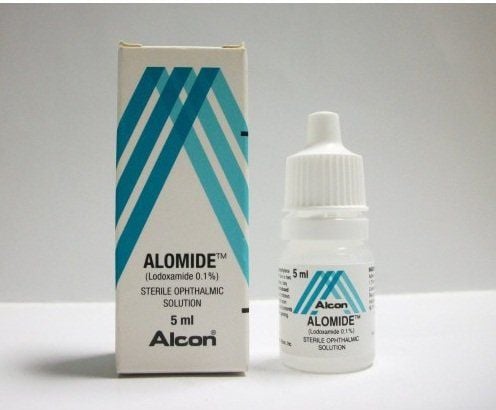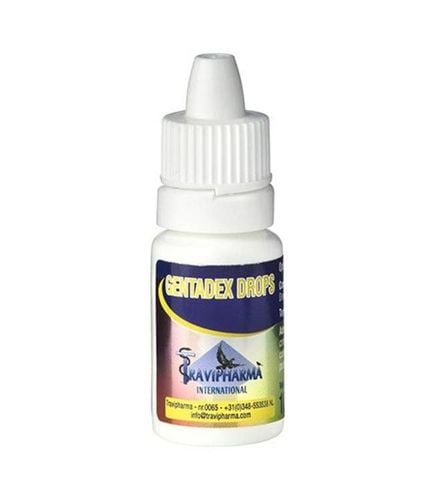This is an automatically translated article.
Polydeson is a drug whose main ingredients are Dexamethasone and Neomycin. It is used in the form of eye drops, nose drops, or ear drops to treat inflammatory conditions and infections. Is Polydeson safe for babies?
1. Ingredients in Polydeson Eye Drops
Polydeson is a product of Vidipha Central Pharmaceutical Joint Stock Company, the main ingredient of Polydeson is Neomycin sulfate 17.5mg and Dexamethasone sodium phosphate 5mg. Polydeson is prepared in the form of eye, nose and ear drops with a volume of 5ml.Neomycin sulfate: this is an aminoglycoside antibiotic, neomycin-sensitive bacteria can be listed as: Staphylococcus aureus, Escherichia coli, Haemophilus influenzae, Klebsiella, Enterobacter, Neisseria. Neomycin is a widely used topical drug, so there are now relatively wide reports of resistance, typically Staphylococcus, some strains of Salmonella, Shigella and Escherichia coli. There is cross-resistance to Kanamycin, Framycetin and Paromomycin.
Neomycin is less absorbed from the gastrointestinal tract, the drug is not destroyed in the gastrointestinal tract and will be eliminated in the feces. Absorption of Neomycin may be increased by contact with inflamed or damaged mucous membranes. After the drug is absorbed, it is rapidly eliminated by the kidneys in the active form, the half-life of the drug is about 2 - 3 hours.
Dexamethasone is a glucocorticoid with anti-inflammatory, anti-allergic and immunosuppressive effects, the drug works by binding to cell receptors, translocating into the cell nucleus and affecting a number of genes. code translation. Glucocorticoids also exert a direct, non-mediated effect on receptor binding. Dexamethasone, when used topically for eye drops, external ear canal or lip mucosa, will effectively treat inflammatory or allergic symptoms.
Dexamethasone: the drug is well absorbed at the drug site, then distributed into all tissues in the body, this active ingredient can cross the placenta and a small amount is excreted in milk.
2. Uses of Polydeson eye drops solution
Polydeson is indicated for use in the following cases:
Inflammation - eye infection: Conjunctivitis, eyelid inflammation, keratitis, lacrimal sac; Inflammation - nasopharyngeal and sinus infections, allergic rhinitis ; otitis externa without perforated tympanic membrane, especially eczema with superinfection of the tympanic membrane; Acute otitis media .
3. Dosage and how to use Polydeson 5ml solution
Polydeson is used for eye, nose and ear drops:
Note that after the medicine has been used for ear and nose drops, the bottle must not be used for eye drops; When using Polydeson 5ml, avoid contaminating the dropper; Do not inject Polydeson 5ml into the eye; Do not use pressure to pump Polydeson into the ear; When instilling Polydeson into the ear, it is necessary to keep the head tilted for a few minutes so that the drug is more easily absorbed, avoiding leakage; Do not use Polydeson for more than 10 days, if used beyond 10 days, consult a doctor. Dosage of Polydeson 5ml for adults:
Eye drops: 1-2 drops/time, use 2-4 times/day; Drop nose, ear drops: 1-2 drops/time, use 2-4 times/day. Dosage of Polydeson 5ml for children over 1 year old must follow the doctor's prescription.
Many people wonder: Can Polydeson be used for babies? Polydeson is contraindicated for use in children under 1 year of age.
The above dosage of Polydeson is for reference only. The specific dose of Polydeson depends on the condition and the progression of the disease. Polydeson is a prescription drug, so it is necessary to consult a doctor or medical professional before use, do not buy and use the drug yourself. When patients have signs or symptoms of ototoxicity, Polydeson should be discontinued immediately and auditory functions should be monitored.
If the patient forgets a dose of Polydeson, take it as soon as possible, but if it is almost time for the next dose, skip the missed dose of Polydeson and take the next dose at the scheduled time, do not double. prescribed dose.
4. Side effects of Polydeson drug solution
When using Polydeson, patients may experience unwanted effects according to each active ingredient in the drug.
Specific side effects of Neomycin are as follows:
Common: Hypersensitivity reactions to drugs causing itching, drug fever and anaphylaxis. Uncommon: Increased liver enzymes and bilirubin, hematopoietic disorders, hemolytic anemia, confusion, paresthesia, disorientation, nystagmus, increased salivation, stomatitis... may lead to dizziness, nystagmus and deafness, even after discontinuation of the drug. Side effects of Dexamethasone:
Common: Electrolyte disturbances (hypokalemia, sodium and water retention causing hypertension and edema), endocrine and metabolic disorders (Cushing's syndrome, decreased ACTH secretion, adrenal atrophy, impaired glucose tolerance, menstrual disturbances ), muscle atrophy, osteoporosis, pathological fractures, spina bifida, aseptic osteonecrosis, peptic ulcer bleeding, perforated ulcer, inflammation pancreatitis, skin atrophy, erythema, ecchymosis, hirsutism, insomnia, euphoria. Uncommon: Hypersensitivity, anaphylaxis, leukocytosis, thromboembolism, weight gain, increased appetite, nausea, malaise, hiccups, sterile abscess.
5. Contraindications of Polydeson
Polydeson drug is contraindicated in the following cases:
Hypersensitivity to one of the components of Polydeson. Corneal herpes; Glocom; Epistaxis ; Perforation of the eardrum due to trauma. Children under 1 year old; Viral infections, fungal infections, tuberculosis infections of the eye.
6. Precautions when using Polydeson
Polydeson should not be used for a long time (due to the risk of causing many eye complications, causing superinfection with non-susceptible bacteria, including fungi...). The condition of the vitreous intraocular pressure should be checked regularly. In the event of an acute ocular purulent event, corticosteroids in Polydeson may mask signs of infection or aggravate an existing infection; Check the eardrum (not damaged) before taking Polydeson ; Use caution when administering Polydeson to patients with glaucoma; There has been a phenomenon of cross-resistance between Neomycin and Kanamycin, Framycetin and Gentamicin, so it is necessary to avoid using Polydeson topically for too long, because it can cause skin sensitization, cross-sensitization with other antibiotics of the aminoglycoside group. Patients may become deaf after using Polydeson in the ear or on a large wound; Polydeson has a neuromuscular blocking effect that can cause respiratory depression and respiratory arrest; Polydeson should be used with extreme caution in patients with kidney disease, liver disease, or impaired hearing. In patients with infections or suspected infections, attention must be paid to treatment with specific antibacterial drugs first because dexamethasone has an immunosuppressive effect, causing exacerbations and spreading infections. In people with corneal perforation, diabetes, hypertension, heart failure, kidney failure, tuberculosis, it is necessary to closely monitor and actively treat these diseases if there is a need to use Dexamethasone; Use caution when administering Polydeson to pregnant and lactating women.
7. Polydeson drug interactions
Some drug interactions Polydeson
Polydeson causes reduced absorption of phenoxymethylpenicillin, digoxin, methotrexate; The risk of nephrotoxicity, hearing will be increased when Polydeson is used concurrently with strong diuretics such as ethacrynic acid, furosemide; Increased neuromuscular blocking effect when using Polydeson concurrently with neuromuscular blocking agents. Polydesone will be reduced effect because Barbiturates, Phenytoin, Rifampicin,, Carbamazepine, Ephedrine, Aminoglutethimide Polydesone increase the hypokalaemic effect of Acetazolamide, Thiazide, loop diuretic, carbenoxolone; Polydeson antagonizes the effect of agents that cause hypoglycemia, hypotension, and diuretics. After using Polydeson, you should close the bottle cap tightly and put it in the outer box and close it tightly.
Polydeson is a drug whose main ingredients are Dexamethasone and Neomycin. It is used in the form of eye drops, nose drops, or ear drops to treat inflammatory conditions and infections. Polydeson is contraindicated in infants under 1 year of age.
Follow Vinmec International General Hospital website to get more health, nutrition and beauty information to protect the health of yourself and your loved ones in your family.
Please dial HOTLINE for more information or register for an appointment HERE. Download MyVinmec app to make appointments faster and to manage your bookings easily.













